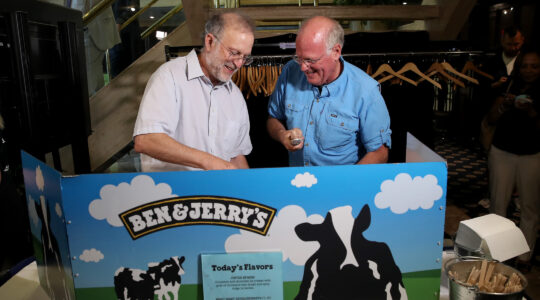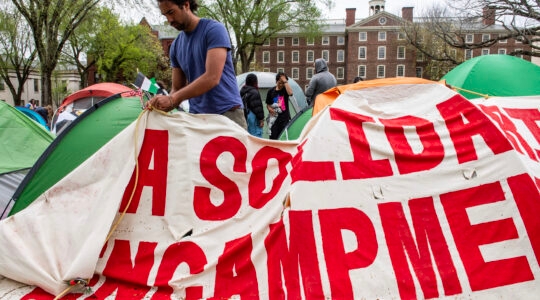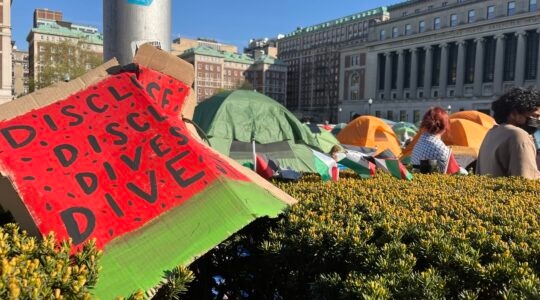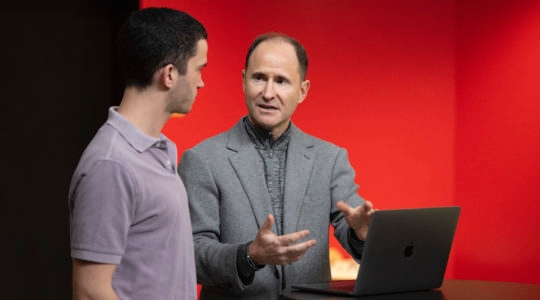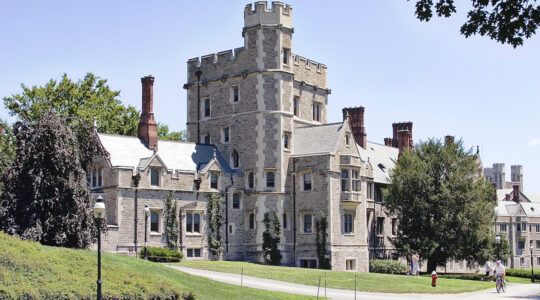SAN FRANCISCO (JTA) – Three years ago, Sharon Papo and Amber Weiss stood under a chupah in a Santa Cruz redwood grove and recited their vows before 100 relatives and friends.
They stomped on a glass, stood nose to nose wrapped in a tallit and sipped from a kiddush cup – Jewish rituals that sealed them forever. But to the government, their union was invisible.
That changed this week in San Francisco when they added one word – lawfully – that was absent from their original vows.
“Amber, my bashert, my beloved,” Papo said to Weiss inside San Francisco City Hall. “… I take you to be my lawfully wedded wife.”
Just hours before, Papo and Weiss had taken their ivory-beaded chiffon wedding gowns out of the closet of their Berkeley home, hopped on local transit and walked into City Hall to exchange vows once more.
This time they had legal recognition.
On May 15, the California Supreme Court ruled in a 4-3 decision that all citizens have a constitutional right to marry. Consequently, the court said in its sweeping ruling, the state cannot prohibit gay and lesbian couples from legally marrying.
Papo, 29, and Weiss, 31, married June 17, the first day same-sex marriages were legally sanctioned by the state.
Hundreds of same-sex couples across the state legally married that day, including 152 at San Francisco City Hall.
Jews representing numerous organizations set up a chupah, made from a rainbow-striped tallit, near the steps of City Hall. Volunteers passed out plates of marble cake frosted with the phrase “Mazel Tov,” and invited couples to partake in the rituals of circling one another and breaking a glass. A klezmer band inspired many rounds of the song “Siman Tov U’ Mazel Tov.”
“It’s so nice to see our community celebrate around such positive energy,” said Lisa Finkelstein, the director of the LGBT Alliance in San Francisco.
Journalists followed Papo and Weiss like a bridal party, capturing the historic moment. About 30 photographers surrounded them in the City Hall rotunda, their camera shutters clicking so furiously that witnesses could barely hear the vows.
The women’s eyes glistened during the ceremony. Only when officiant Mariposa Bernstein said what they had never heard before – “By the power vested in me by the state of California” – did the joyous couple let tears dampen their faces.
For many couples married that day, the ceremony was not the first time they had pledged to love each other in sickness and in health, till death do they part.
Weiss and Papo, for instance, married in 2005 in Santa Cruz, with Rabbis Lavey Derby of Tiburon’s Congregation Kol Shofar and Paula Marcus of Aptos’ Temple Beth El co-officiating.
“In our hearts, we’re married,” Papo said. “But now we’re married in the eyes of the state, and that means the world to us.”
Craig Persiko and Geoff Benjamin, both of San Francisco, spent a year planning a traditional Jewish ceremony, which they held in May 2000 at Buena Vista Park in this city, five years after first meeting through mutual friends in Chicago.
They married again one year later in Vermont, and a third time in 2004, when state Assemblyman Mark Leno married the couple at San Francisco City Hall while they held their then-7-month-old daughter, Serafina.
“As far as my relationship, I don’t feel any different,” Persiko said back in 2004, “but on a political level, it feels really empowering.”
The couple performed their vows for a fourth time Saturday in their backyard in conjunction with a joint birthday party for their son and daughter. Cakes for both occasions sweetened the afternoon.
Rabbi Mychal Copeland and Kirsti Copeland were married eight years ago by two rabbinic students on the New Jersey campus of Princeton University. The Jewish wedding was “a very powerful experience and awakened our friends and family to the permanency of our relationship,” Rabbi Copeland said, but “it meant nothing at all in the civic sense.
Since their wedding, they have become mothers and wed a second time at San Francisco City Hall.
On June 18, the couple celebrated their marriage with a third wedding ceremony at the San Mateo County Courthouse. Not wanting to overshadow their original vows, it was a civil ceremony.
“We already sanctified our union through the eyes of our religious tradition,” said Rabbi Copeland, who works at the Stanford University Hillel. “It makes me realize the irony that in some of our communities, Judaism was ahead of this country’s legal system by decades.”
Finkelstein said at San Francisco City Hall, she was proud to see representation from Congregations Sha’ar Zahav and Emanu-El, the San Francisco-based Jewish community federation and the East Bay federation, Jewish Community Relations Council, the Progressive Jewish Alliance and Jewish Mosaic.
Near the chupah outside City Hall, “Energy 92.7” had set up a tent to broadcast live, interviewing “just married” couples and offering champagne flutes of sparkling cider.
Each time a couple walked outside – marriage licenses proudly raised in the air – the crowd erupted in applause. Supporters banged on drums and waved rainbow banners.
Members of the First Unitarian Church gave away nearly 400 cupcakes. Wedding photographers and pastry chefs passed out fliers and heart-shaped chocolates to advertise their services. A Mission Kids preschool class snaked through the crowd wearing green T-shirts. Their teacher, Abigail Sawyer, said she wanted to inspire “support for equality from a young age.”
Same-sex couples from around the country flocked to the Golden State this week, since unlike Massachusetts, marriage licenses were granted to California residents and nonresidents alike.
Mike Silverman and Dave Greenbaum traveled from Lawrence, Kan., to wed in San Francisco. They were married nine years ago at an Omaha, Neb., synagogue, an occasion that inspired them to scour Jewish wedding books and design a ceremony with “the right kavanah,” intention.
On June 17, they wed inside City Hall, one wearing a Hillel T-shirt from the University of Kansas. They then circled one another under the chupah outside.
“While the civil recognition was important, for me as a Conservative Jew it was real when I said the Shehechiyanu and properly acknowledged the source of this immense and profound blessing,” Greenbaum said.
Will Kansas recognize the Silverman-Greenbaum marriage when the couple returns to their home state?
“I’ll hold out for the Moshiach first,” Greenbaum joked.
The issue of gay marriage has been moving through the California courts since 2004, when San Francisco Mayor Gavin Newsom issued the order to grant licenses to gay and lesbian couples.
The state Legislature twice approved bills giving same-sex couples the right to marry, but they were vetoed by Gov. Arnold Schwarzenegger.
In preparation for the marriage rush, San Francisco and other counties deputized numerous volunteer marriage commissioners.
Jared Scherer, 34, signed up and on June 17 officiated at the marriage of his friends Tyler Barrick and Spencer Jones during an emotional ceremony. Scherer looked official in a black gown, which he last wore during his commencement at Brandeis University.
“It was absolutely incredible, a true honor,” said Scherer, who is Jewish, about presiding over the marriage of his non-Jewish friends. “I felt really lucky to be able to help move the cause forward.”
“The cause” could hit a brick wall in November when a ballot initiative – if approved by a majority of voters – would define marriage as “valid and recognized” only between a man and a woman.
In light of this vulnerability, Karen Erlichman, the Bay Area director of Jewish Mosaic, a national LGBT nonprofit, says it is especially important for individuals and organizations to show support for marriage equality.
Two of the 14 couples in the Supreme Court case are interfaith Jewish couples: Diane Sabin and Jewelle Gomez live in San Francisco; Robin Tyler and Diane Olson reside in Los Angeles and were the first couple married June 16 at the Los Angeles County Courthouse in Beverly Hills.
The 14 couples were represented by several legal nonprofits, including the National Center for Lesbian Rights. Vanessa Eismann, a lawyer and a member of Congregation Sha’ar Zahav, worked on the case through the center.
Eismann said it was a professional privilege and a deeply personal pursuit. She and her partner, Cate Whiting, were married by a Los Angeles rabbi in 2005.
The absence of legality didn’t temper their joy, Eismann said, but since both are lawyers, the couple knew that “regardless of how lavish a ceremony you have, you’re only legally married when the license is signed.”
The 33-year-old San Franciscan gave birth to a baby boy in April, and the couple say they want their son to grow up knowing his parents are married. Eismann said that was a shared sentiment among many of the plaintiffs.
“Often the desire to marry isn’t just for the couples themselves but out of a desire for their children to be treated equally under the law,” she said.
Eismann and Whiting will take their marriage certificate with them to Los Angeles, so the rabbi who signed their ketubah, or Jewish marriage certificate, finally can sign their legal marriage license as well.
“This battle isn’t over,” Eismann said. “Unfortunately, our rights are being put up for a popular vote.”
Jewish couples are fighting for marriage equality in numerous ways.
Kathy Levinson and Naomi Fine of Palo Alto are choosing not to marry this summer. Instead, they will donate the money they would have spent on a formal wedding ceremony to organizations campaigning for marriage equality.
Papo and Weiss have asked friends and relatives in lieu of wedding gifts to “make a contribution to fight this hate bill,” suggesting that donations go to Marriage Equality USA or Equality California.
They have also decided to be as public as possible with their sexual orientation. Papo casually mentions her relationship to everyone she encounters – the clerk at Office Max, the salesman at the shoe store. Likewise, Weiss always introduces Papo as her wife.
“It makes it personal,” Weiss said. “It’s harder to vote against the civil rights of someone you know.”
JTA has documented Jewish history in real-time for over a century. Keep our journalism strong by joining us in supporting independent, award-winning reporting.
